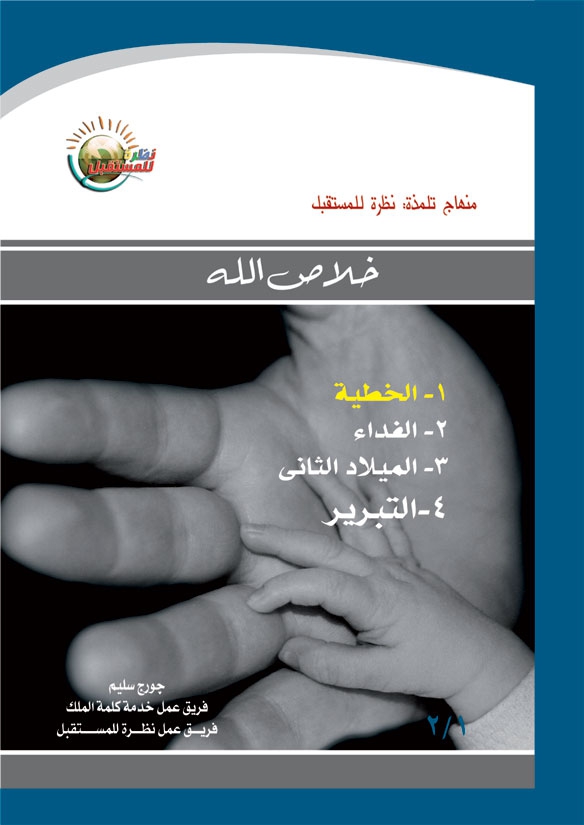Discipleship Curricula
Making disciples is the system followed by Christ from the beginning of his ministry with the twelve disciples, and again, later, with the seventy apostles. The practice of discipleship is not one of the various ways that we can choose to use, it is the only way, and the solution for preparing every new generation of believers for ministry and leadership, to influence the lives of others—because Jesus Christ himself used discipleship. This curriculum aims to help new believers grow in their spiritual life.
God’s Redemptive Salvation
Author: Mr. George Selim
Publisher: Vision For Future
Sin
“But your iniquities have separated you from your God; your sins have hidden his face from you, so that he will not hear.”
(Isaiah 59:2)
The Bible defines sin as transgression or going beyond the limits of what is allowed. Sin entered the world when Adam and Eve disobeyed the commandment of God, by eating from the tree of the knowledge of good and evil, which God had commanded them not to eat from. This original sin, which was inherited from Adam and Eve, then branched into many sins, such as neglecting to do good deeds, false words, crooked behavior, fraud, bribe, injustice, arrogance, pride, idol worship, and other miscellaneous sins.
Sin has a certain nature, of finding a foothold, of hunting for an entry point, of attaching to us and clinging to us like a poisonous pollution. We are polluted and pulled down by it. Sin is known for its multiplicatively insidious nature, as it reproduces and spreads like a malignant tumor which only leaves us after having destroyed us. Finally, sin is characterized by deception because its source, the Devil, is the deceiver.
People have various attitudes towards sin, such as ignoring it, denying it, minimizing it, confusing it with other things, to conceal it, and to justify and console ourselves. But God does not distinguish between external or internal sins, small or great sins. Before God, all sins are unacceptable, among all the statures of humanity, because God will always condemn sin, regardless of the perpetrator’s greatness.
Sin has results. It separates man from God and prevents blessings. It leads to destroying the spiritual and psychological levels of our being. It brings shame and bitterness to us. It destroys relationships and leads to eternal destruction. In spite of this, as was said by the esteemed Egyptian Saint, Moses the Black, long ago: “There is no sin that cannot be forgiven, except the one which is without repentance.”
Redemption
We hear a lot these days about the kidnappings of people, whether by road gangs or pirates in the sea. Sometimes they hijack a whole aircraft. The kidnappers demand ransom and threaten to kill hostages. Governments do their best to save the lives of those who have been abducted.
Sin has kidnapped man, and made him suffer, not only from physical death, but also from eternal death and destruction. As the one who is kidnapped screams and cries for help, so the human soul screams for its rescue from the slavery of sin, eternal death, and darkness.
We all have sinned and insulted God, others, and ourselves. We have even harmed the environment. However, God, in his love, has prepared redemption to heal us from the killing disease of sin and to liberate us from our burden of sins. He paid a ransom to redeem us.
Redemption means "to save by paying a certain price." Al-Muhit Arabic Dictionary says that to redeem means to pay something to save a person.
A ransom is paid as compensation for the faults committed by man. It is paid for his liberation from the state of misery. Take the example of a person paying a large amount of money, in order to release a slave who has been enslaved for many years, whether during a war, because of kidnapping, as a result of bankruptcy, or simply by birth. This action of payment will forever be considered a major event in the slave's life because in the moment his price, or ransom, was paid, he became free.
A ransom covers the whole thing, whether the reason for imprisonment is a mistake or slavery. Thus, the paid price for ransom is always called atonement, which means "covering." Atonement must be an acceptable alternative for both the fault and the person subjected to insult. In light of these analogies, we can ask ourselves questions like, "How did God tell humanity about redemption? How did He redeem man? What was the ransom presented to God for the sins of mankind?"
Second Birth
“Praise be to the God and Father of our Lord Jesus Christ! In his great mercy he has given us new birth into a living hope through the resurrection of Jesus Christ from the dead.”
(1 Peter 1:3)
The resurrection of Christ from the dead opened the door to our second birth. This birth is a new beginning, the birth of a new creature. Christ said that the source of this birth is from above, to clarify that this new birth is only from God. This new birth from above is distinguished by a life of purity. When Christ washed the feet of his disciples, he said to Peter, “Those who have had a bath need only to wash their feet; their whole body is clean” (John 13:10). His reference to having had a bath refers to a person’s experience of the second birth. It is a real experience that, like our human birth, happens once and is not repeated. The word, “to wash their feet,” means to daily clean ourselves from sin, in order to enjoy good spiritual health, and to be in fellowship with God. This illustrates for us that our new birth is like having had a bath, but, from time to time, we still need to purify our behavior from any wrong deeds. The second birth is an inevitable and basic need. It is not a secondary or incidental need. Jesus said, “no one can see the kingdom of God unless they are born again” (John 3:3).
The new birth happens when we hear the good news, which reveals Christ’s love and death for our sake, and his victorious resurrection over death and sin. So our hearts move and believe in the work of Christ on the cross. Then we repent from our sins. Thus, God's mercy covers us and the Holy Spirit completes the new birth. One of the results of the second birth is that we become the children of God. The Apostle John says, “See what great love the Father has lavished on us, that we should be called children of God!” (1 John 3:1). Our names will be written in the Book of Life, as Jesus said, “rejoice that your names are written in heaven” (Luke 10:20). Thus we will enjoy the spiritual inheritance. The Apostle Paul says, “Now if we are children, then we are heirs—heirs of God and co-heirs with Christ, if indeed we share in his sufferings in order that we may also share in his glory” (Romans 8:17). We will live in the hope of the resurrection from the dead. We are assured that we will go to heaven on the basis of the work of Christ. And we will receive spiritual glorified bodies.
The newborn people hate and reject sin completely. They love the life of righteousness. Their heart is full of true love for others. Their behavior submits to the guidance of the Holy Spirit. They are able to overcome the world. Many people may suspect that they have been born again, but our true guides are not traditions or ideas but are the Bible, the Holy Spirit, and the new conduct, which together express the reality of our salvation from sins, and thus we know we enjoy this new birth.
Justification
He was delivered over to death for our sins and was raised to life for our justification.
(Romans 4:25)
The death of Christ on the cross may strike some people as hurtful and painful, but were it not for this great work, we would not have been saved from our sins. Christ died and was buried, and with him, all of our sins were buried too. Christ defeated the pains of death by his glorious resurrection, and the results of this great resurrection of his body were our assurance of redemption and justification.
Justification means to change the human condition and position before God, from being a guilty person who deserves the eternal judgment, to become a man to whom the Lord will not impute sin or guilt. Thus we have become acceptable before God without any judgment. Justification is a judicial action in which man will not be punished for his guilt. The guilty man becomes righteous. Justification is based on various doctrines that relate to good works—but the Bible teaches us that human justification before God based on human work and self-righteousness is impossible, because we have all committed sins. The sentence of death has to be applied on us, so we needed a solution from God.
Justification is one of the most difficult and most complex problems in the universe. Even though it would have been easier for God to implement the judgment of eternal death and send us all to hell, in order to achieve justice, He chose to send Jesus Christ to die instead of us. God also achieved justice in this way because Christ bore our sins in His body on the cross. What a wonderful exchange he made for us! We were saved and justified, not because we deserved it, or for a personal reason, but because it was the work of God alone through Jesus Christ’s holiness. This justification results in complete forgiveness, as the bible says, “I, even I, am he who blots out your transgressions, for my own sake, and remembers your sins no more” (Isaiah 43:25). Justification also produces a perfect peace, as the Apostle Paul says, “Therefore, since we have been justified through faith, we have peace with God through our Lord Jesus Christ” (Romans 5:1).




